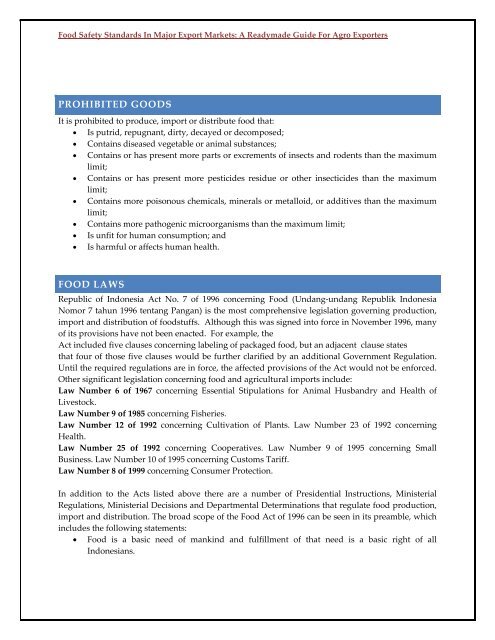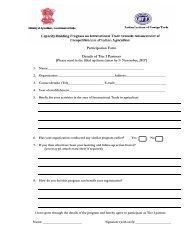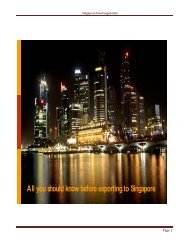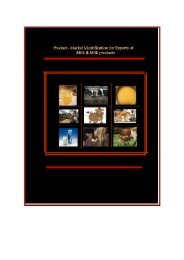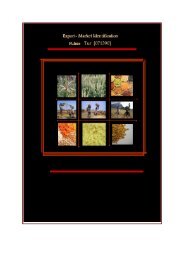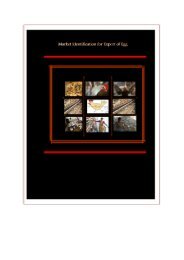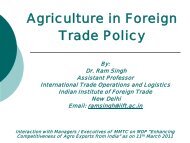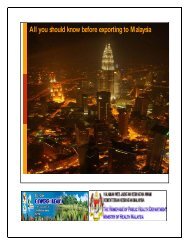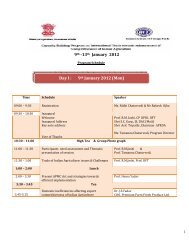All you should know before exporting to Indonesia - Ministry of ...
All you should know before exporting to Indonesia - Ministry of ...
All you should know before exporting to Indonesia - Ministry of ...
You also want an ePaper? Increase the reach of your titles
YUMPU automatically turns print PDFs into web optimized ePapers that Google loves.
Food Safety Standards In Major Export Markets: A Readymade Guide For Agro Exporters<br />
PROHIBITED GOODS<br />
It is prohibited <strong>to</strong> produce, import or distribute food that:<br />
Is putrid, repugnant, dirty, decayed or decomposed;<br />
Contains diseased vegetable or animal substances;<br />
Contains or has present more parts or excrements <strong>of</strong> insects and rodents than the maximum<br />
limit;<br />
Contains or has present more pesticides residue or other insecticides than the maximum<br />
limit;<br />
Contains more poisonous chemicals, minerals or metalloid, or additives than the maximum<br />
limit;<br />
Contains more pathogenic microorganisms than the maximum limit;<br />
Is unfit for human consumption; and<br />
Is harmful or affects human health.<br />
FOOD LAWS<br />
Republic <strong>of</strong> <strong>Indonesia</strong> Act No. 7 <strong>of</strong> 1996 concerning Food (Undang‐undang Republik <strong>Indonesia</strong><br />
Nomor 7 tahun 1996 tentang Pangan) is the most comprehensive legislation governing production,<br />
import and distribution <strong>of</strong> foodstuffs. Although this was signed in<strong>to</strong> force in November 1996, many<br />
<strong>of</strong> its provisions have not been enacted. For example, the<br />
Act included five clauses concerning labeling <strong>of</strong> packaged food, but an adjacent clause states<br />
that four <strong>of</strong> those five clauses would be further clarified by an additional Government Regulation.<br />
Until the required regulations are in force, the affected provisions <strong>of</strong> the Act would not be enforced.<br />
Other significant legislation concerning food and agricultural imports include:<br />
Law Number 6 <strong>of</strong> 1967 concerning Essential Stipulations for Animal Husbandry and Health <strong>of</strong><br />
Lives<strong>to</strong>ck.<br />
Law Number 9 <strong>of</strong> 1985 concerning Fisheries.<br />
Law Number 12 <strong>of</strong> 1992 concerning Cultivation <strong>of</strong> Plants. Law Number 23 <strong>of</strong> 1992 concerning<br />
Health.<br />
Law Number 25 <strong>of</strong> 1992 concerning Cooperatives. Law Number 9 <strong>of</strong> 1995 concerning Small<br />
Business. Law Number 10 <strong>of</strong> 1995 concerning Cus<strong>to</strong>ms Tariff.<br />
Law Number 8 <strong>of</strong> 1999 concerning Consumer Protection.<br />
In addition <strong>to</strong> the Acts listed above there are a number <strong>of</strong> Presidential Instructions, Ministerial<br />
Regulations, Ministerial Decisions and Departmental Determinations that regulate food production,<br />
import and distribution. The broad scope <strong>of</strong> the Food Act <strong>of</strong> 1996 can be seen in its preamble, which<br />
includes the following statements:<br />
Food is a basic need <strong>of</strong> mankind and fulfillment <strong>of</strong> that need is a basic right <strong>of</strong> all<br />
<strong>Indonesia</strong>ns.


